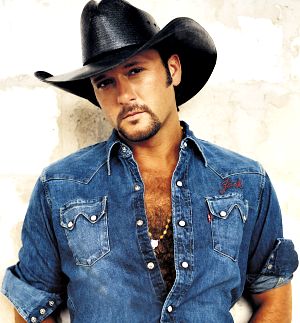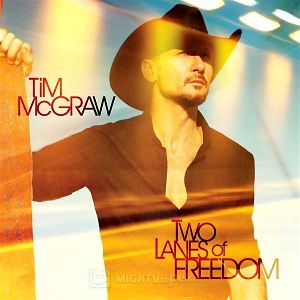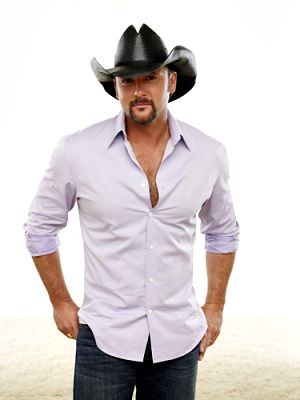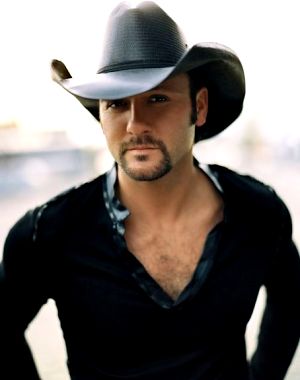DAVE'S DIARY - 12 MARCH 2013 - TIM MCGRAW FEATURE
TIM
MCGRAW
TWO LANES OF FREEDOM (BIG MACHINE)
"Now I ain't sayin' them LA ladies don't know what they're doin'/ And I been in love with New York City a time or two/I had some Seattle coffee, some Chicago wind/ Some Kansas sweet fields I'd love to see again/ But the fireflies play where the cattails grow/ And them southern girls, they talk nice and slow with/ Kisses sweeter than Tupelo honey/ Little bit crazy like New Orleans/ Memphis blue and Daytona sunny/ Soft as cotton in some cut-off jeans." - Southern Girl - Jaren Johnston-Lee Thomas Miller-Rodney Clawson.
 |
Singing
actor Tim McGraw fought and won protracted bitter battles for freedom
from his embryonic label Curb. It was worth it - for the 14th time in his career he reached No. 1 on Billboard chart - with 12th album Two Lanes of Freedom. McGraw's first album for Big Machine also debuted at #2 on Billboard all genre Top 200 with 106,000 copies sold. Tim's teaming with expat Australasian superstar Keith Urban and Taylor Swift on finale track Highway Don't Care also scored 85,881 downloads on debut beating Lady Antebellum Downtown with 72,358 downloads. OK that's the cold hard sales facts - what about the music? |
Well, McGraw
doesn't write his own material so he relies on the Nashville A team -
writers and session musicians.
His first hit Truck Yeah - with its double entendre hook - was
aimed squarely at radio and video and served its purpose.
It's also a crowd favourite - Truck Yeah.
The infectious ode to cold beer, muddy tyres, Friday night football and
all those things that make a hillbilly proud sets the mood.
McGraw - long-time singing spouse of fellow star Faith Hill - nails his
love of southern belles and Dixie dreams throughout his new album.
ONE OF THOSE NIGHTS
"She's
getting dressed up, putting on that lipstick/ Shimmy shaking, right into
them cut-offs baby, oh yeah/ You're getting off work, cashing out that
paycheck/ Gotta change that shirt and pick that girl up on her front step/
Here she comes now looking so fine/ You've been waiting on this night
for such a long, long time." - One Of Those Nights - Luke Laird-Rodney
Clawson-Chris Tompkins.
Instead of balancing the up-tempo tune with a ballad for the second single,
Tim kept the energy level high with One of Those Nights - his 33rd
#1 single.
"Everybody loves a song that can put them in the mind of something
that they did growing up," the 45-year-old father of three daughters
says of the nostalgic hit.
"That's a making a memory song. I think what's attractive about that
song is that you've either had those memories or you're looking forward
to making those memories. So it sort of grabs everybody, young and old.
You can look back on your life and think about the times you felt that
way. And as a teenager, you start thinking about all the memories you're
going to make throughout your life."
Nostalgia has long been McGraw's strong suit.
"Sometimes, you know. I love history, but I don't spend a lot of
time thinking about my past, in particular, because I'm really focused
on trying to do the things I want to do in my life and live my life and
move forward. I think one of these days maybe I'll get on a rocking chair
and look back, but right now I'm too busy moving forward."
TWO LANES OF FREEDOM
"Two hearts, two bucket seats, too much sun not to wear shades/ Boot to the pedal and pedal to the metal, we're the reason this road was paved yeah/ Now honey, how fast you wanna go, NASCAR driving Miss Daisy/ Radio loud, radio low, or I can sing if you want me to baby/ I can tell God's smiling down, I just get that feeling/ You and me going town to town, on two lanes of freedom." - Two Lanes Of Freedom - Jaren Johnston-Jenn Schott.
 |
With
11 tracks on the local pressing - 15 on the deluxe version - there's
plenty of variety and royalties to spread among the writers. McGraw kicks entrees with the anthemic title track - an easy choice with its pedal to the metal mentality. "Oh, that song is like hitting a release button!," says McGraw. "The sounds in that record have this sort of Gaelic-driven thing, and it's got this film director Terrence Malick vision, this epic quality to it. It really drove the sounds and what the rest of the album felt like. That's the reason it's the title track. That's the reason it's the lead-off song of the album because it sets the tone for the whole record." |
So what about
audience reaction?
"I mean, as an artist, you really feed off the audience a lot,"
McGraw added. "Their energy reflects off of you - and vice versa.
So when you play a new record, you get a feel really quickly. I've done
that throughout my career. I've done stuff really early to get it out
there and play it in a live venue. If something strikes someone in that
situation - when they're there to hear hits and they're not too disappointed
to hear something new - then you know you might have something."
This 20-year veteran of the business wants to go is not career reinvention
but more to an accelerated career momentum.
"There's something special about this record to me, in the optimism
that it has," Tim revealed.
"I'm looking forward to more stuff than I've ever had happen before;
there's more ahead of me than behind me. I feel like I've grabbed another
gear."
McGraw is trying to purge his legal battle with Curb from his memory bank.
This freedom is all about the music.
"Nothing good happens from anything without concentrating on what
you do musically," the Louisiana native admitted when asked if pending
lawsuits affected the making of this new album.
"All this other stuff you can't do anything about. You can't make
people do the things that you think are right, but you can make your music
the way you want to make your music and that's what I concentrate on."
McGraw is equally at home on his ballads that are vibrant vignettes painting
vivid character portraits.
In Friend of a Friend, the protagonist longs for an old flame who
has moved away and married, but like a plot twist in a movie, the song
ends with unexpected optimism for a rekindling.
NUMBER 34705
"Oh, he listens to the countdown, every Sunday morning/ from a cold
solitary prison cell/ and the music from his radio is like freedom down
a dirt road/ Makes that eight by ten a brighter hill/ Before he started
doing all the hard time that he's doing/ He was singing in them honky-tonks
and dives / He dreamed of being somebody, now he's number 37405."
- Number 37405 - Tom Douglas-Troy Jones.
 |
The
flawed character in Number 37405 mines melancholia and regret
as the song details the deadly decision that put a once promising
young talent behind bars. One of the writers is Tom Douglas - a prolific song source for McGraw. "People want to project themselves into the song, or project themselves onto the screen when they're in a movie," says the singer who starred in movies including The Blind Side and Friday Night Lights. "They find a character that they can identify with and walk through this scenario with them. That's what music does when it strikes the right chord." This regret-laden ballad is a riveting take on consequences that finds McGraw again playing the omniscient narrator role to perfection. |
"It's
a movie, that song," says McGraw. "'The ol' judge on the bench
said son your life's got consequences.'" It had to have some gravitas.
You just had to let that song talk.
(Songwriter) Tom Douglas' voice had to come through on that." Regarding
the song's extended coda, McGraw says, "My whole process that one
was after that last line I wanted people to have time to think and absorb
the whole situation. Where does he go? What does he think about? What
does the whole thing feel like?"
BOOK OF JOHN
"We were sittin' round the supper table/ And the buzz of the frigid
air/ Was the only sound til Mama laid down/ A book she found upstairs/
It was covered in dust in the back of the closet Goodwill box/ We almost
tossed it out/ We could've lost all those memories/ There was a picture
of Mama in the pourin' rain/ Ticket stubs to a Braves game/Silver Star
and a baggage claim From Hanoi, Vietnam." - Book of John - Jon
Nite-Greg Becker.
Book of John hits home hardest for the father of three daughters.
The poignant lyrics tell the story of a son going through his late father's
scrapbook.
Although Tim didn't have a long relationship with his father, the late
baseball legend Tug McGraw, he says upon hearing the song for the first
time, the impact was profound.
"I remember Missy Gallimore (wife of producer Byron Gallimore) sent
me that song over and the miracle of modern technology now, I just figured
out how to do that in the last year and I had it on my iPhone," McGraw
revealed.
"I remember
sitting at my kitchen table, there's some woods out in the backyard, and
I was looking across the woods and the song really hit me hard. It was
just one of those songs that sort of flooded you with emotion. It was
just a guitar and a vocal. I knew instantly I wanted to record it. I just
had a great connection with that song."
It hit home for McGraw.
"And it's from a different place than you might expect because my
stepfather growing up, early in my life - it was a very chaotic part of
my life, that period and the relationship that we had," McGraw explained.
"And I didn't know my dad until I was an adult, so I really don't
have sort of a deep well of knowledge about a father and son relationship,
and now I have all daughters. When I heard this song it was sort of a
way for me to explore that relationship without having it. It's really
an emotional record for me. And when I perform it live, it's still one
of those songs that sort of, you really have to reach down deep and grab
hold to keep from getting too emotional when you sing it."
McGraw also draws on former members of his road band The Dancehall Doctors
- Brett and Brad Warren - and James Slater for his Tex-Mex laced up-tempo
radio friendly song Mexicoma.
The pun primed paean to lost love is mixed in a liquid south of the border
blender.
NASHVILLE WITHOUT YOU
"It'd be just another river town/ Streets would have a different sound/ There'd be no honky tonks with whiskey rounds/ No dreamers chasin' dreams down No tourists taken' in the sights/ No Stetsons under Broadway lights No pickers playin' for pocket change/ No rhinestone boots on an old church stage." - Nashville Without You - Kyle Jacobs-Joe Leathers-Ruston Kelly.
 |
McGraw
may be on the cutting edge of country crossover but still tills
its roots in his music - especially in the love metaphor of Nashville
Without You. So who are McGraw's mentors? |
"Merle
Haggard was a big deal to me," McGraw recalled.
"When I met him, it was one of those moments where you're speechless.
You can't really say anything. He fills the room with his presence. He's
very intense and very smart, too."
So what about the high profile of his adoptive hometown Nashville?
"I'm so proud of this town," McGraw says.
"I've said this a million times, but when I moved here, I fell in
love with Nashville instantly. I would have lived here no matter what.
If I hadn't had a career in music, I would have found something to do
in this town because I love it so much. The people are so fantastic, the
history in this town, everything about it. I'm glad that people are starting
to discover it, although you don't want too many people to discover it
because you don't want it to change too much. Any friends that we've had
come out from L.A. or wherever to visit, they always fall in love with
Nashville, and everybody wants to live here. It's one of the last great
places to raise a family. And to pursue a music career, for sure. Country
music is in a great place right now with a lot of great artists."
And the growth?
"I feel like it's hitting another rebirth, I guess, like it did in
the early 1990s," Tim says.
"I feel like we're going through one of those. And it's because of
the great new artists that we have coming out and the artists who are
making great music. It's a great time for everybody in the business."
Closing the 13-track album is another open road eulogy Highway Don't
Care - the duet with Taylor Swift that features Keith Urban on guitar.
Tim couldn't win acclaim from his daughters by bringing them into the
studio for that song, as the artists' recording sessions were done separately.
But the result, the singer says, is something he's been wanting to do
for a long time with his two friends.
"When we got it back, it was pretty spectacular. Taylor's voice on
there, she just really nailed it. And Keith's guitar playing - I don't
think you'll find a more talented guy around."
Tim credits Taylor, Keith and powerhouse vocalist wife, Faith, with making
him want to be a better musician.
And with 33 No 1 singles, 41 million albums sold, 12 CMA Awards and diverse
accolades, the superstar is looking forward with an electrified spirit
that came from Freedom.
"I don't think I'm anywhere close to doing the things I want to do.
There's so much more ahead of me, and I have a lot of room to get better,"
Tim says. "Sonically, there's a freshness to this record and a drive
behind it that is new to me and headed in a different place. But I won't
know that until I go into the studio for the next record and see where
it takes me."
McGraw has been a tour headliner most of his recent career - he shares
billing with Kenny Chesney but still recalls being a support act.
"Briefly. I did a tour with Sawyer Brown, which was awesome, and
I had a lot of fun with them." McGraw explained. "I did a tour
with Joe Diffie. Little Texas and I did a tour together. And I opened
for Dwight Yoakam for a little while, too. I'm a big fan. I love Dwight's
new record. I'd love to do a record with Dwight one of these days."
So how did his song list differ back then?
"I played a lot of album cuts. Because I didn't have that many hits.
I still do The Joker a lot of times, and I used to do the Allman
Brothers' Ramblin' Man. You carried a little bit about what you
learned in clubs until you had enough hits to do a whole show. I don't
even remember my first headline show. I don't even remember what it looked
like. For my first headline tour in '96, Faith was my opening act."
So how did recording of the new disc differ from those days?
"I did all of the vocals in the basement of my house," he says.
"I would go down at night after the kids had gone to bed and just
do track after track, and I'd sing every track all the way through instead
of line after line. Not that I won't ever do line by line, I will. But
with this one there was a connection that happened, especially with some
of those story songs, and it made more sense to do it that way. It's a
narrative, and it's easy to get off track tonally in a song like that
and not realize it. But I never got emotionally drained, I got emotionally
inspired."
WINNING ON THE BLIND SIDE
Tim McGraw wished Baltimore Ravens lineman Michael Oher good luck before
the recent Super Bowl.
Tim played Oher's adoptive father in the film The Blind Side and
admitted he was pulling for the offensive lineman (who was played by Quinton
Aaron in the film).
"It would be nice to see Michael win," said McGraw before The
Ravens brought the dream to fruition.
McGraw appeared in the film opposite Sandra Bullock, who won an Oscar
for her performance. It tells the story of Oher's rise from a homeless
teen to the star of his high school's football team after being adopted
by the family.
CLICK HERE for an earlier Tim McGraw feature in the Diary on May 23, 2010.